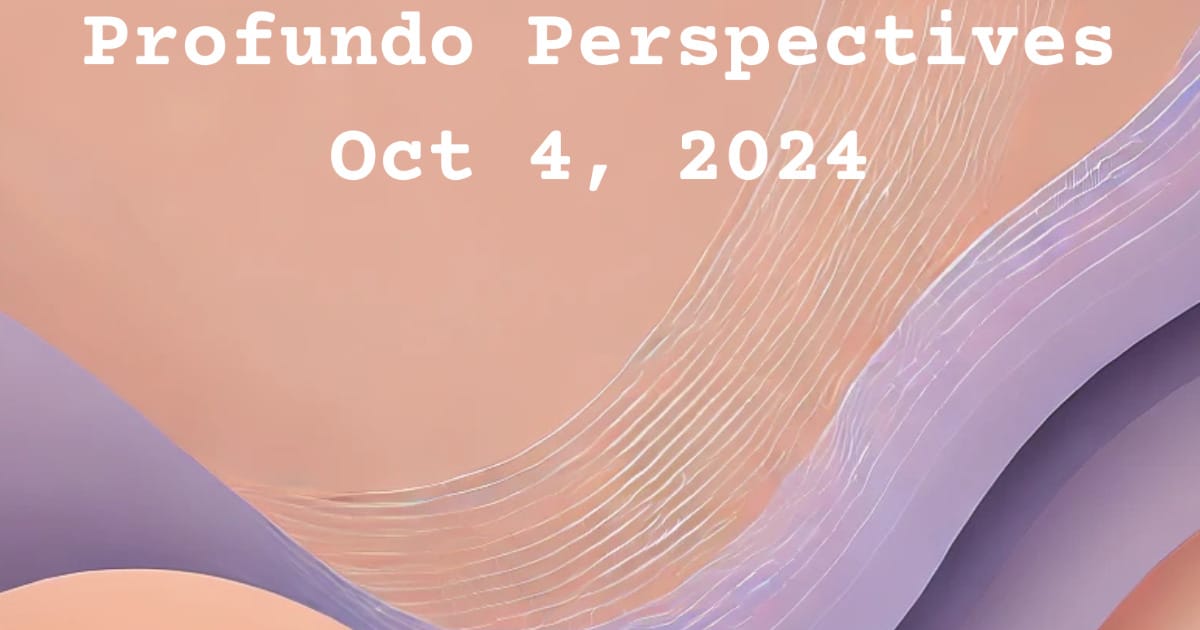- Profundo Perspectives
- Posts
- Profundo Perspectives: October 4, 2024
Profundo Perspectives: October 4, 2024
Algorithms, Automation, and Astrobiology: Unpacking Today's Tech, Labor, and Space Exploration Frontiers

Today’s edition focuses on the forces shaping technology, global markets, and societal structures. To read the full research papers click on the “Learn More!” buttons below each report.
Recent Updates:
🛑 US Port Strike: Ripple Effects on the Economy and Supply Chain
The fallout from the recent dockworkers' strike, its economic impact, and the broader debate over automation versus job security.
👓 Meta's Smart Glasses: Balancing Innovation with Privacy Threats
Exploring the dangers of advanced wearable tech, including privacy concerns, ethical dilemmas, and the risks of misuse in public spaces.
🪐 Europa Clipper: NASA's Quest to Uncover Life Beyond Earth
Insights into NASA's mission to explore Jupiter's moon Europa, its subsurface ocean, and the tantalizing possibility of extraterrestrial life.
Discover Something New:
🔑 Quantum Computing and Cryptography: The Race to Quantum-Resistant Security
How quantum computing is challenging current cryptographic systems, and what steps are being taken to secure data against these emerging threats?
🗳️ Social Media Algorithms: Navigating Their Role in Political Polarization and Echo Chambers A deep dive into how algorithms influence what we see, their role in fostering echo chambers, and the ongoing debate about their impact on political discourse.
Profundo Community Poll:
Help shape next week's edition! 🌟 Vote for a topic you'd like us to explore, comment with a suggested paper, or share a link to an interesting Profundo paper you'd like featured. Your input drives our content—let's learn more together!
Made With Profundo
Profundo is your AI-powered research and reporting tool, tailored to make data collection, analysis, and reporting seamless. Unlike traditional AI models like OpenAI, Profundo is designed specifically for deep research. With custom templates, unparalleled accuracy, and a focus on real-time insights, Profundo is the best tool for academics, analysts, and learners.
Try it out here: https://www.profundo.app/
Recent Updates

Key Takeaways
Immediate Impacts and Resolution:
Labor-Driven Disruption: The 2024 US port strike highlighted tensions over automation in port operations, with dockworkers demanding wage increases and a complete ban on automated technologies to protect jobs.
Severe Supply Chain Impact: The strike caused substantial disruptions, affecting 54 container ships and stranding around 100,000 containers at key ports. Retailers, automotive manufacturers, and agricultural sectors were among the hardest hit, facing potential shortages and increased costs.
Economic Costs and Inflation: The strike cost the U.S. economy an estimated $5 billion per day, with impacts potentially reigniting inflation due to rising costs for food, autos, and consumer goods.
Lingering Issues: Unresolved automation concerns suggest future negotiations could still lead to labor disruptions.
Long-term Risks & Implications:
Supply Chain Vulnerability: The strike exposed the fragility of critical supply routes. Businesses may need to diversify logistics strategies to avoid future risks.
Changing Labor Relations: The ILA’s stand against automation could inspire similar movements, potentially leading to more frequent labor disputes in the shipping industry as technology evolves.
The Dangerous Side of Innovation: Doxing Threats Posed by Meta Smart Glasses

Key Takeaways
Advanced Capabilities & Privacy Risks:
Meta's Ray-Ban smart glasses integrate video streaming and facial recognition, enabling real-time identification. This presents significant privacy threats, particularly with tools like the I-XRAY project automating personal data retrieval.
Privacy & Ethical Concerns:
Built-in safeguards like LED indicators to signal recording are often inadequate, raising ethical concerns about unintentional surveillance and lack of informed consent.
Doxxing Threats:
The use of facial recognition with smart glasses poses serious risks for doxxing. The technology allows users to gather personal details like names and addresses, leading to potential harassment and privacy violations.
Regulatory Challenges:
Privacy regulations like GDPR offer some protection, but inconsistent standards across regions, particularly between Europe and the United States, make it challenging to manage privacy risks effectively.
Societal Impact:
The potential for widespread use of these technologies could erode public anonymity, foster mistrust in social spaces, and raise broader ethical questions about the balance between innovation and individual privacy.
Exploring New Frontiers: NASA's Europa Clipper Mission Seeks Signs of Life on Jupiter's Moon

Key Takeaways
Mission Goals & Exploration:
Assessing Habitability: Europa Clipper aims to evaluate whether Jupiter’s moon Europa could harbor life by studying its subsurface ocean, ice shell, and surface features.
Focus on Key Life Ingredients: The mission will investigate water, essential chemistry, and energy sources—critical for potential extraterrestrial life.
Technological Tools & Challenges:
Advanced Instruments: The spacecraft is equipped with tools like ice-penetrating radar and magnetometers to study Europa's ice thickness and ocean salinity.
Overcoming Obstacles: Budgetary and technical challenges were addressed through advocacy from The Planetary Society and Congressional backing, enabling mission progress.
Future Exploration & Potential:
Path to Finding Life: Success could lead to future missions targeting direct life detection, moving beyond Mars to explore Europa’s potentially habitable environment.
New Frontiers: Europa Clipper’s findings may redefine humanity’s search for life, highlighting the significance of icy moons in astrobiology.
Discover Something New
Quantum Computing and the Future of Cryptographic Security: Navigating the Transition to Quantum-Resistant Encryption

Key Takeaways
Quantum Computing Threats:
Shor’s Algorithm Impact: Quantum computing, particularly through Shor's algorithm, threatens traditional cryptographic systems like RSA and ECC by drastically reducing the time needed to solve complex encryption problems.
Cryptographic Vulnerability: Current encryption methods, based on the difficulty of factoring large numbers, are at risk of becoming obsolete as quantum technology advances.
Post-Quantum Cryptography (PQC):
Quantum-Resistant Solutions: PQC aims to create cryptographic algorithms that remain secure against quantum computers. NIST has begun standardizing new algorithms to replace vulnerable systems.
Corporate Integration: Companies are starting to integrate PQC into their systems, preparing for the inevitable rise of quantum capabilities.
Challenges & Transition Strategies:
Need for Cryptographic Agility: A major challenge is ensuring systems can smoothly transition between cryptographic methods. Lack of agility complicates the adoption of PQC, requiring fundamental changes to current infrastructures.
'Harvest Now, Decrypt Later' Risk: Data collected now could be decrypted in the future once quantum computing becomes powerful enough, emphasizing the urgency of adopting PQC to protect sensitive information.

Key Takeaways
Algorithmic Influence on User Experience:
Personalized Engagement: Social media algorithms, such as those used by Facebook and YouTube, prioritize personalized content to maximize user engagement, often reinforcing user interests through curated feeds.
Content Prioritization: Platforms like Instagram and Twitter use relationships, engagement levels, and content relevance to shape what users see, impacting the diversity of information presented.
Role in Political Polarization:
Creation of Echo Chambers: Algorithms often promote content aligned with users’ past preferences, creating echo chambers and reinforcing existing beliefs, which contributes to political polarization.
Amplification of Extremes: The tendency to prioritize sensational content that attracts engagement can lead to the amplification of extreme political views and misinformation, further deepening divides.
Regulatory and Mitigation Strategies:
Potential Solutions: Suggested approaches include increasing transparency around algorithmic operations, using public oversight to manage personalization, and integrating interventions to diversify content feeds.
Balancing Engagement with Diversity: Effective mitigation may involve recalibrating algorithms to encourage exposure to diverse viewpoints without sacrificing user engagement, fostering more balanced digital environments.
Profundo Community Poll
💡Got an idea you want us to explore? Just reply with your suggestions or shared paper links!
Write With Profundo
Start transforming your research today
Stay Connected
Join our community and help shape the future of AI-driven research:
Reply